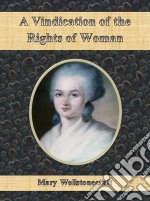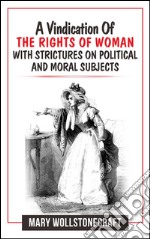Mary Wollstonecraft eBooks
eBooks editi da Mary Wollstonecraft di Formato Epub
A vindication of the rights of woman. E-book. Formato EPUB Mary Wollstonecraft - Mary Wollstonecraft, 2014 -
M. Wollstonecraft was born in 1759. Her father was so great a wanderer, that the place of her birth is uncertain; she supposed, however, it was London, or Epping Forest: at the latter place she spent the first five years of her life. In early youth she exhibited traces of exquisite sensibility, soundness of understanding, and decision of character; but her father being a despot in his family, and her mother one of his subjects, Mary, derived little benefit from their parental training. She received no literary instructions but such as were to be had in ordinary day schools. Before her sixteenth year she became acquainted with Mr. Clare a clergyman, and Miss Frances Blood; the latter, two years older than herself; who possessing good taste and some knowledge of the fine arts, seems to have given the first impulse to the formation of her character. At the age of nineteen, she left her parents, and resided with a Mrs. Dawson for two years; when she returned to the parental roof to give attention to her mother, whose ill health made her presence necessary. On the death of her mother, Mary bade a final adieu to her father's house, and became the inmate of F. Blood; thus situated, their intimacy increased, and a strong attachment was reciprocated. In 1783 she commenced a day school at Newington green, in conjunction with her friend, F. Blood. At this place she became acquainted with Dr. Price, to whom she became strongly attached; the regard was mutual.
A vindication of the rights of woman with strictures on political and moral subjects. E-book. Formato EPUB Mary Wollstonecraft - Mary Wollstonecraft, 2016 -
Mary Wollstonecraft produced her own declaration of female independence in 1792. It is one of the earliest works of feminist philosophy. In it, Wollstonecraft responds to those educational and political theorists of the 18th century who did not believe women should have an education. She argues that women ought to have an education commensurate with their position in society, claiming that women are essential to the nation because they educate its children and because they could be “companions” to their husbands, rather than mere wives. Instead of viewing women as ornaments to society or property to be traded in marriage, Wollstonecraft maintains that they are human beings deserving of the same fundamental rights as men.

